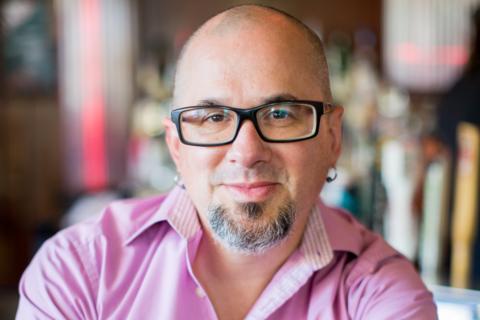In his new memoir, Charles Monroe-Kane defines his own success story by describing the trials and tribulations of conquering his drug addiction and mental illness.
“Lithium Jesus: A Memoir of Mania,” which was published Sept. 13 by the University of Wisconsin Press, takes readers on a roller coaster of Monroe-Kane’s past from faith healer to avid drug user to successful journalist.
Monroe-Kane was misdiagnosed with schizophrenia when he was 20, then properly diagnosed with Bipolar 1 disorder when he was in his 40s.
Approximately 5.7 million adult Americans, or 2.6 percent of the U.S. population, deal with bipolar disorder, according to the National Institute of Mental Health.
Monroe-Kane said though mental illnesses do not have cure-all solutions, it is important for people to understand that their mental illness can be controlled and that things can get better — a message he hopes will come through in his memoir.
Born in 1969, Monroe-Kane grew up in impoverished Ohio. He was just a young boy when he began hearing voices.
For his first 12 years he kept these voices hidden for fear of what others would think. But keeping it all to himself put him in agony, which led Monroe-Kane to cut himself or rip off his fingernails and toenails.
“That is not the person you want to be friends with, that is not the person you want to screw, that is not [who] you want to go on vacation with,” Monroe-Kane said. “So you just cover it up and learn a way around it.”
It wasn’t until he was invited to attend an Evangelical church camp at the age of 12 that he told others about the voices.
Monroe-Kane found people similar to him who could speak in tongues and hear voices, which convinced him that the voices were actually angels.
“Suddenly there were these people who were experiencing what I was experiencing so I was like ‘sign me up,'” Monroe-Kane said.
At age 15, Monroe-Kane emancipated himself and traveled to the Philippines and Haiti as a faith healer for the Evangelist church. One man who was crippled walked again after Monroe-Kane put his hands on him, he said.
It wasn’t until Monroe-Kane was 20-years-old at Goshen college in Indiana, that the voices turned on him, questioning him.
Monroe-Kane went into his closet and refused to come out. Eventually the cops came and he was institutionalized. His doctors gave him lithium and thorazine, and suddenly, the voices went away.
“You’re stuck with a man with no money whose entire background — everything about him — was about hearing voices and being an evangelical healer, and now I don’t have either one,” Monroe-Kane said.
Searching for new meaning, he bought a one-way ticket to Amsterdam ready to live life on the street.
Before Amsterdam, Monroe-Kane didn’t have any experience with sexuality, drugs or alcohol. Instead of dipping his his toes into the pond, he jumped right in, starting with acid.
He once took acid 30 days in a row, then transitioned to meth. During this time, he joined a circus, started a record label and briefly held a job with a radical environmentalist anarchist group.
By 24-years-old Monroe-Kane said he felt burned out, but refused to acknowledge that his mishandling of his mental illness could be the root of his manic behavior.
He packed his bags and moved to Prague, living there until he was 29-years-old. At one point he attended a 4,000 person rave where he drank a cocktail of liquid ecstasy, methadone, liquid LSD, meth and Everclear, causing him to overdose.
“Part of me wanted to see how far I could go, but I think another part of me wanted to see if I could die,” Monroe-Kane said. “I didn’t have enough balls to do it so I thought I could do it to myself on accident.”
But he still wasn’t done with his lawlessness. One of his friends offered him the chance to smuggle money from the Italian mafia into eastern Europe in exchange for a percentage.
When Monroe-Kane returned from his mafia trip, he realized he wanted to move past his drug addiction and illicit activities. He asked his girlfriend Erika, who is now his wife, what their next move should be, knowing their life was a toxic mess.
Thankfully Erika too wanted to change their lifestyle so the pair packed their bags and moved to Madison, Wisconsin. They quit drugs, had two kids and acquired successful jobs, his wife at the Madison Museum of Contemporary Art and he a producer for National Public Radio in Madison.
In 2012, Monroe-Kane returned to his lithium medication after being re-diagnosed with Bipolar 1 disorder. This allowed him to take back his life and really reflect on the past 20 years.
Though Monroe-Kane is not not embarrassed by his past drug use or manic behavior, he realized that being off his medication and abusing substances was not making him a good father, lover or friend.
Still, he regrets nothing. It is not the smooth path that makes you stronger, but rather the bumps in the road, Monroe-Kane said. Living a safe life prohibits you from being the person you truly are supposed to be, he said.
Currently he continues to take his medication and has never been more proud to be the man he is and the road it took to get there.
“I want those people who have a mental illness to know that it isn’t all Oprah,” Monroe-Kane said. “Sometimes it is a complicated story and the path we are on is a mess, but it doesn’t have to be clean and it will be okay in the end.”


